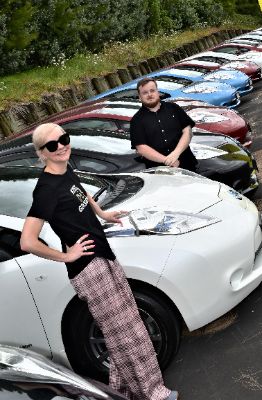Mercury Plans Multi-million-dollar Expansion Of EV Subscription Service

Mercury will invest $6 million to turbo-charge its EV subscription service, aiming to add around 50 EVs a month to its fleet to lift its total EV subscription fleet to around 450 vehicles.
“This will open more doors for more Kiwis to more easily get behind the wheel of an EV,” said Mercury’s Chief Marketing Officer, Julia Jack.
The announcement of the programme’s expansion follows two years of it operating as a pilot. Over that period, Mercury has worked to understand how to best design and price a service to meet the needs of subscription customers while being commercially sustainable.
“We’ve spent the last two years watching, testing and learning, and now we’re ready to deliver on a bigger scale. Key to this was identifying models that tick the boxes for people in terms of affordability, performance and practicality and the standout during this stage was the Nissan LEAF.”
She said for this reason Mercury would focus primarily on late-model Nissan LEAFs for initial shipments but hopes to be able to take advantage of an expanding range of EV models in the future.
It’s expected that at full capacity Mercury’s service will see more than 500 people experience an EV in the first year alone. By switching from an internal combustion car, these subscribers would contribute to taking a total of 1,020 tonnes of CO2e* out of the atmosphere each year.
Jack said that to truly shift the dial, New Zealand’s predominantly fossil-fuel powered transport system needed to better leverage the country’s largely renewable electricity system.
“We know upfront costs can be a major barrier for a lot of people when it comes to making the switch. Having an EV subscription service that stacks up economically removes these challenges.”
She said that in the current climate, ongoing vehicle ownership expenses like WOFs, Road User Charges, and maintenance costs were becoming less and less palatable.
“Both here and globally we’re seeing more people seriously consider subscription services in the wake of economic uncertainty caused by Covid-19. There’s much less appetite for ‘dead assets’ sitting in the driveway, depreciating by the minute.”
Mercury’s Product & Operations Manager, Kane Bublitz, said Mercury’s two-year pilot of 60 EVs had proved that if an organisation could get the construct right, people genuinely wanted to go electric.
“At the moment we can’t keep up with the demand, and that’s a great problem to have. By adding 50 EVs to our fleet every month we can continue to meet the needs of our subscribers and hopefully help hundreds more people kiss oil goodbye.
“The electric revolution is quickly gaining momentum in New Zealand. The Government has committed to its agencies converting to electric vehicles, and potential policies such as fleet emissions standards, “clean car” feebate schemes and bans on used fossil fuel vehicle imports are getting more and more airtime. This should be a major signal to manufacturers that we’re ready for a greater variety of EV makes and models at a range of price points,” he said.
For more information: evdrive.co.nz
* Stats on CO2 emissions, assuming 450 vehicles at an 80% utilisation rate:
a) 0.248 kg CO2e/km (1,600 – 2,000 cc petrol car, based on MFE Climate Change guide)
b) 11,446 km p.a. (Ministry of Transport)
c) Therefore 2.8 tonnes of carbon emitted per annum per car
d) 450 cars times 80% utilisation saves ~1020 tonnes of carbon emitted per annum


 IRANZ: Budget Reaction – Time To Back Science With Long-Term Investment
IRANZ: Budget Reaction – Time To Back Science With Long-Term Investment Better Taxes for a Better Future: Budget Of Austerity Piles On Least Well-Off, Misreads Public Mood
Better Taxes for a Better Future: Budget Of Austerity Piles On Least Well-Off, Misreads Public Mood Nicola Gaston, The Conversation: NZ Budget 2025 - Science Investment Must Increase As A Proportion Of GDP For NZ To Innovate And Compete
Nicola Gaston, The Conversation: NZ Budget 2025 - Science Investment Must Increase As A Proportion Of GDP For NZ To Innovate And Compete Maritime Union of New Zealand: Maritime Union Condemns Threatened Job Losses On Aratere Ferry
Maritime Union of New Zealand: Maritime Union Condemns Threatened Job Losses On Aratere Ferry Science Media Centre: Proposed Increase To Glyphosate Limits – Expert Reaction
Science Media Centre: Proposed Increase To Glyphosate Limits – Expert Reaction Electricity Authority: Welcomes Plan For Boosting Consumer-Supplied Flexibility
Electricity Authority: Welcomes Plan For Boosting Consumer-Supplied Flexibility


